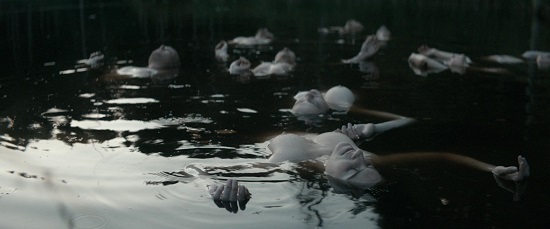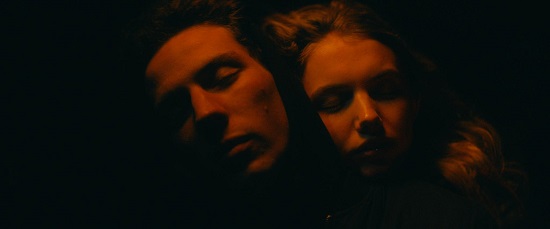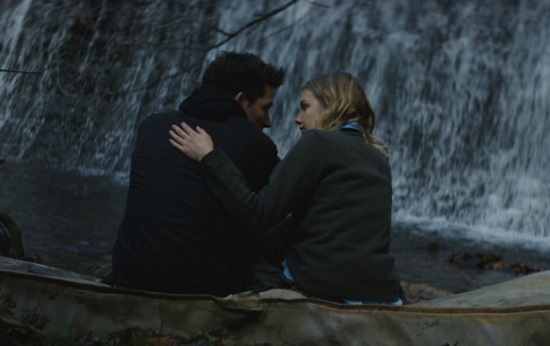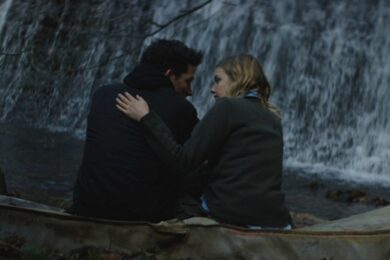One of the stand-out films of this year’s Gothenburg Film Festival was Jeppe Rønde’s new feature, Bridgend. Rønde’s known for documentaries, and though this is his first fiction feature it’s based on real events. The story portrays the epidemic of teenage suicides that have been happening in and around the Welsh town of Bridgend since 2006. It’s a brave choice of subject matter for Danish director Rønde – making fiction about suicide is a minefield in itself, making fiction about real suicides doubly so. But Rønde’s approach, based heavily on visits to Bridgend and interaction with the community, has allowed him to make an astonishing film – it’s quite unexpected, raw and yet perfectly judged, intimate and yet universal, sensitive and yet brutal.
Teenager Sara (Hannah Murray) moves back to Bridgend with her policeman father (Steven Waddington) after spending years in Bristol; the community welcomes them back, absorbing them into the fabric of the town as if they’d never left, and Sara immediately becomes absorbed into a local group of wild teenagers. The town’s welcome, though, has an edge of mistrust – her dad’s profession means Sara’s position amongst her peers is never quite certain.
Nevertheless, she’s soon hanging out down by the lake or at the rugby club, binge-drinking and flirting. They’re like any normal group of young people today. The only difference here is that kids from this group keep hanging themselves in public places, places where their parents are going to be the people that find them, and no one is talking about why. Not that no one talks. The teenagers talk plenty about their dead friends, but they never talk about why they died. It’s a tacit acknowledgement of the fact that to assign a reason to a suicide is usually simplistic and inadequate. It’s not quite an assertion of the complexity of the factors that contribute, but that’s only because this film never makes the mistake of making assertions – everything that looks like a theory being put forward is considered, questioned, and found wanting. It’s an example of the confidence of Rønde’s script, for example, that the idea this could turn into some kind of serial murder thriller is raised and dismissed early – the mystery here is of a far subtler and more troubling nature.
The film also understands and considers the media. Media involvement in the Bridgend deaths has been accused of playing a part in encouraging further suicides, by romanticising the dead, suggesting that they will be remembered and that in this way, dying can give meaning to a meaningless life. Bridgend handles this through showing the community reacting negatively – violently – to external press intrusion, but also gives us snippets of the online chat rooms in which the teenagers break all the Samaritans’ media guidelines. They talk of their dead friends looking after each other now, being remembered and being in a better place. By giving these voices to the teenagers, the film problematises these attitudes, acknowledging that sometimes, the coping mechanisms that naturally arise in a situation like this can be toxic and unhelpful. A lesser film wouldn’t be able to walk this line so confidently, and it’s a testament to the strength of Bridgend’s script that it can do so.
Bridgend is also an extraordinarily beautiful film. The cinematography is exquisite in its roughness, creating a menacing, dreamy, intimate feel in its misty, haunted forests, steep, narrow streets and claustrophobic, dimly lit tea-time interiors that’s at once other-wordly and deeply evocative of the Welsh valleys. Sara has a horse, Snowy, who sometimes becomes her entire background – he’s both a symbol of freedom to her in her world so hemmed in by mountains and fog, and a symbol of the natural world that surrounds and threatens to overwhelm her humanity. She doesn’t need to be human when she’s riding. Her boyfriend Jamie (Josh O’Connor) has a motorbike, a similar symbol. Perhaps, the film is saying, there is a gentler way of escaping the life that’s suffocating them. But it’s not a reassuring statement, if life in a particular place and time is something that has to be escaped one way or another.

Jeppe Rønde was kind enough to discuss the film with us.
This is a Welsh story, not a Danish one. How did you become attracted to the idea of making the film, not coming from Bridgend?
Jeppe Rønde: Let’s say that to do film or to tell stories is universal. I’ve done a film in Zulu, a documentary called The Swenkas. I didn’t need to know that language, but for me, the story was important and universal – it was about a son coming to terms with the death of his father. There’s no such thing as one you can only film in your own back yard. If there is something that speaks to you, in its own universality, then it’s there. And if there is something that is universal, then it’s, unfortunately, what’s happening in Wales.
It touches a lot of people’s lives. Is that one reason why?
I spent six years travelling to and from Bridgend for research, and what I found was people like you and me and an underlying collective unconsciousness that basically runs in us all and makes us follow each other, for good and bad – so yes, for me it is very much a universal subject.
How did the community respond to you being there? Were they welcoming, or were they suspicious? Did you get a range of reactions?
You know, you can’t actually go there as a journalist, you will probably get beaten up, especially if you want to go for quotes. I got to go in through some youth workers, because I was not a journalist, and I got to meet some of the youngsters. But I met many more just going out, being open. I told them what I would like to do and that I would like to hear stories. And all the kids, they wanted to talk, but not all the adults. It’s like a big taboo over there.
In the end, we stood up at the working men’s club to greet people and say what our project was, and ask if it was OK to shoot in the village. We shot in the vicar’s house, and the local pub, the local school and police station, and we used people from there and their houses. So it turned out to be something which I also wanted, to have the village be part of it. It went from something that was very difficult, seven years ago when I started, to being actually a nice experience when we were shooting a year ago. Because at first, I feared they would come at us and maybe smash our equipment or something, but nothing like that happened – quite the contrary.
You portray media intrusion in the film, people smashing journalists’ cameras. I wondered if that was personal experience.
You can hardly blame them, if journalists come and say that they are salesmen, or even Jehovah’s Witnesses, just to come inside the door and get a quote. Then, you get mad. All this exploitation there had been, primarily of the young.
And the adults?
It might be their kids that died, but it’s the adult that got killed. In a symbolic sense. I don’t know if it was deliberate, we don’t really know, but most of the kids hanged themselves where they would be found by their parents. The adults refer to the suicides as their Columbine massacre.
And the youngsters didn’t leave any notes.
No.
It’s difficult, with so many unanswered questions. But you didn’t try and close down any options, you left it ambiguous.
Because how could I? Then I would know the meaning of life.
But a lesser film would have tried to give us some kind of an answer, perhaps.
Well, yeah, most people would like that. A modern person wants an answer, so we can move on with our normal lives, because it’s horrific to maybe come to the conclusion that we have it in us, in ourselves, that it could happen to us, that it’s part of our nature too. But I do know it can happen to anyone.
When I was in Bridgend once, 26 dolphins swam up to the shore and committed mass suicide just south of the county, in Cornwall. Marine biologists called it that, mass suicide. Why did the dolphins do that? What is it that makes us, as mammals, follow each other even though it means that we die? We don’t know.
And as you say, it’s hard to accept that we don’t know, because we want to know.
Exactly. It’s as hard to accept that we have it in us, that it’s part of human nature – as well as
that we are evil, as well, or we can be potentially evil. If something happened and all of a sudden, you had to kill your neighbour before he killed you, it turns out we have it in us, these sides that we don’t like to have. For me, this film is so much about the collective unconscious. Of course, Sara is the main character in the film, but the actual driving force beneath it all is that theme.
Did you have a hard time writing the script? Did you completely fictionalise everything?
I met with some of the youngsters that actually died later on and some that survived more than one suicide attempt. So I have a lot of stories, and I’d put several stories together into one character, so it wasn’t obviously coming from only one person. Everything is built on what I learned there, even the task force of police and psychologists that was sent to the town to stop it. So of course it’s a fictional take on it, but you have to know that I don’t distinguish between documentary and fiction. It’s all film. If I had done a documentary, what you would call a documentary, I would still call it film. Had I done that, it would still only be my truth. So this is my truth as truthfully as I can say it, because I have to respect what is there.
You had to find a way to be true without betraying the people you talked to.
Exactly. That’s number one. Secondly, you get beaten up there if you don’t follow the rules. While researching, I was drugged, and I woke up with blood everywhere. From my knee down was completely smashed. I don’t know what happened – and will probably never know. And I’m still friends with them, they laugh at me when I ask why they did it. I think it was kind of a test. When I do these things, I go all-in. It’s not a strategy. I also want to know, because I like to know myself, or at least come closer to understanding that I should let it go and accept what is in me. So when I meet these kids, or the adults, or grandparents, it’s not just a strategy for making a film, it’s really because it’s an investigation for me. It’s who I am.
Most documentaries are investigations. Most fiction films, they have a why in the end, or they have a plot. But here, it’s open.
Hannah Murray is amazing. She gave it that commitment that the character of Sara has. It didn’t feel like she was acting it, it felt like she had it.
Hannah is extraordinary! And the non-acting was something she and all the others had to go through. And that’s why the actors are all so fantastic, because the trained actors like her and Josh who plays Jamie, and Steven who plays Dave, her Dad, they all had to strip down completely and enter this blackness together with the local ones that were more or less untrained, definitely just themselves. So I didn’t want any acting at all. And they just had to go into this darkness and trust that everything would be fine, and that’s why it was so brilliant that they did. They had to strip themselves of their acting techniques. Which, for an actor, is always their safety net. But I didn’t want that. I wanted it to be on the same level as the kids from there. That’s why it was also free, what to say. There was a script, but they could say what they wanted, as long as we got to go to the same spot and got the right meaning out of it.
People have often said about Bridgend that media reports encourage further suicides. Is there anything you wanted to say about the media?
Well, it all depends on how you do it. I know for a fact that, if you do a radio show on suicide, a newspaper article, anything, a film, then you have to be ready to bear it if someone might respond to it.
Do you worry about that now, in terms of your film?
Of course, I was warned from the beginning that I would have to bear that cross. But I would also have to realise, which is why I decided to move on, that as long as you do it right, then you will have… If you’re unlucky, there may be an increase in suicides just after. But in the long run, the curve will be flatter. Because it really matters to talk about it and to inform.
I think the wrong kind of way, as I described before, was when you go there and exploit it to sell newspapers. That’s the feeling that the youngsters were left with. So if you exploit a tragedy in order to make money, then you’re in the wrong place, regardless of what you do. All the people that just went there to get a fast quote, or a quick film, I can understand that the kids get disgusted by them.
Being there six years is a long time. But I felt I had to be there a long time.
You have to put in your time. Show them that you’re giving something of yourself.
Exactly, and, in a way, that you are to be trusted, because you trust them, and they trust you, and maybe they’ll test you like they tested me, I don’t know.

You had those scenes of violent drunkenness and rampaging, and it sounds like you experienced that while you were there.
Yeah, yeah, I’ve seen it. It’s very brutal.
That’s a curse of British rural youth.
Not only British. I come from the provinces myself, in Denmark. It’s not the same, but it’s ‘the same but different’, as we say.
But you gave it that feel of “this is what happens here.” Can you talk about the design and cinematography? It felt like you had a real sense of that particular place, the Welsh valleys, and it was so evocative.
Well, I was so fascinated by it. For me, it’s extremely beautiful, these little matchbook houses, and the nature, the fog, but at the same time, it’s also depressing. That it rains, and that it’s grey. For me, it’s this oxymoron of opposites. The beauty and the ugly. And then, it was obvious that you have this nature that surrounds them, fences them in. It’s like when you read Ibsen, he used the fjords in Norway as nature-built prisons that you can’t escape from. So I felt it was the same. You can just look at the nature there, they can’t escape it. And they can’t escape the nature in them. As the nature outside is only reflecting the prison that is inside.
And at the same time, it’s so fantastic and horrific that you have this civilisation that nature has taken up. It seems obvious to me that when they had the mines in Bridgend, before Thatcher shut them down in the ’80s.they might have died from lung cancer, but at least they had something, a job and something to be part of. Today, that’s hard to find in the valleys. The elderly still talk about it as the good old days, but the kids have nothing like that. We always want to be part of something, especially when we’re young, and some would say the young are now together in death. So when the kids in the film go down the train track, and the forest has taken over the track, you just know there’s something at play here… the civilisation that was is definitely gone. Nature has taken over. It was a quite perfect mirror of a society gone down, at least from a civilisation point of view. But it’s a strong mirror of our insides as well, how nature is taking over and that nature, as I said before, we have to accept.
What are you doing next?
I am working on a new project that is actually Danish, but it could be about anywhere. It’s about a religious cult, from a different perspective. Like any of the films I do, it’s very personal. This one, maybe even more than anything
Is there anything else that you wanted people to know about Bridgend? Anything that you’d particularly like to say to people?
When I was shooting there, there was a cluster in Paris, and one in a university in the USA. It spread from Bridgend to Belfast, and in London, a 12-year-old who had a scrapbook full of Bridgend stuff. I can’t say that we should change as humans, because can we, really? But that’s why I talk about accepting the fact that even though we think “It will never happen to me,” maybe if you know you have it inside, that it’s part of who you are, then you are more careful to say to your children or to your friends, or whoever it is, that you love them. If you feel that love, it’s more difficult, actually, to go and commit suicide, or do atrocities. So that would be the final line, go home and really see each other, and remember to say "I love you."
Talk about it.
If this film only makes just one parent go home and love their kid and talk… then it’s enough.
I think it will get people talking, rather than silence them. That’s how it should be.
I hope so.



